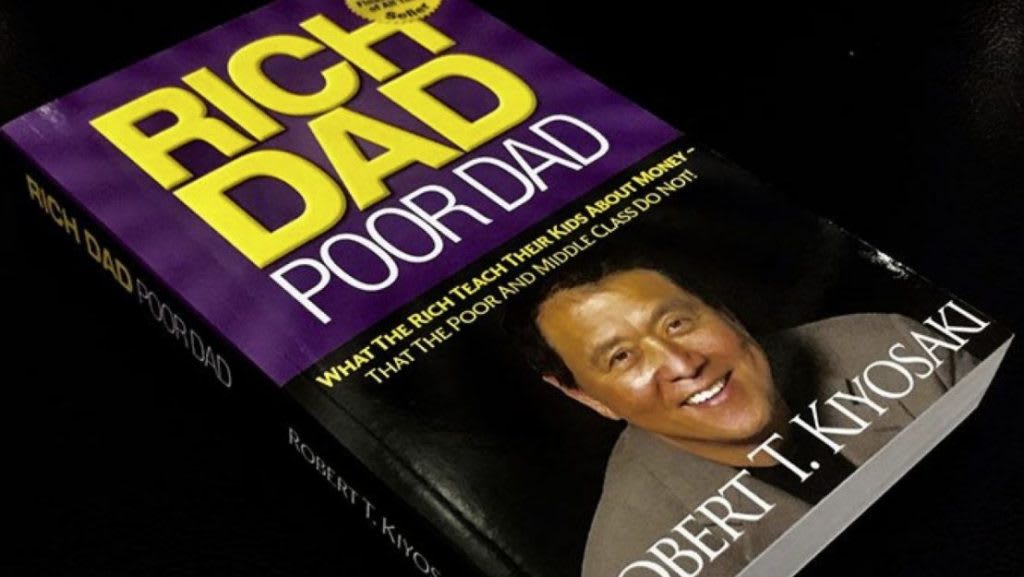Summary of Rich Dad Poor Dad [Book]
Summary,Main Points and 10 lessons from Book

"Rich Dad Poor Dad" is a personal finance book by Robert Kiyosaki. It teaches the importance of financial literacy and challenges traditional ways of thinking about money and investing. The book argues that building assets, such as rental property or a small business, is key to achieving financial freedom, and that having a "rich dad" mindset, which prioritizes financial education and taking calculated risks, is more important than a high income.
"Rich Dad Poor Dad" is a book that focuses on personal finance and wealth-building. The author, Robert Kiyosaki, shares lessons he learned from two father figures in his life: his biological father, who had a traditional job and struggled financially, and his friend's father, who was a successful businessman and investor.
The book highlights the importance of financial literacy, and encourages readers to think outside of traditional norms around money, such as relying solely on a steady job and living below their means. Kiyosaki argues that wealth can be built through investing in assets, such as rental properties, stocks, or small businesses, rather than just saving money. He also stresses the importance of taking calculated risks and learning from failures.
The book also distinguishes between "good debt" and "bad debt", where good debt is debt used to acquire assets that generate income, and bad debt is debt used to acquire liabilities that drain income.
Overall, "Rich Dad Poor Dad" aims to change the reader's perspective on money and financial success, by emphasizing the importance of financial education and taking control of one's finances. The book has become a bestseller and a classic in the personal finance genre.
Main Points of Book
The main points of "Rich Dad Poor Dad" by Robert Kiyosaki are:
- Financial literacy is important: The book emphasizes the need for financial education and understanding money, investments, and taxes.
- Building assets is key to financial freedom: Kiyosaki argues that wealth can be built through investing in assets, such as rental properties, stocks, or small businesses, rather than relying solely on a steady job.
- The difference between "good debt" and "bad debt": Good debt is used to acquire assets that generate income, while bad debt is used to acquire liabilities that drain income.
- Challenging traditional thinking: The book challenges traditional ways of thinking about money, such as living below one's means and relying on a steady job.
- Embracing risk and failure: The author stresses the importance of taking calculated risks and learning from failures, in order to grow and achieve financial freedom.
- Adopting a "rich dad" mindset: The book encourages readers to adopt a "rich dad" mindset, which prioritizes financial education and taking control of their finances, rather than simply working hard and saving money.
10 Lessons from Book
- "Rich Dad Poor Dad" contains several lessons about personal finance and wealth building. Here are ten key lessons from the book:
- The importance of financial education: Understanding money, investments, and taxes is key to achieving financial freedom.
- Building assets: Building assets, such as rental properties, stocks, or small businesses, is more important than saving money.
- Good debt vs. bad debt: Debt used to acquire assets that generate income is "good debt," while debt used to acquire liabilities that drain income is "bad debt."
- Embracing risk: Taking calculated risks is necessary for growth and financial success.
- Learning from failure: Failure is a necessary part of the learning process and should be embraced.
- The importance of passive income: Building passive income streams is a key part of achieving financial freedom.
- The dangers of relying on a steady job: Relying solely on a steady job can be risky, as job security is not guaranteed.
- Challenging traditional thinking: Traditional ways of thinking about money, such as living below one's means, should be challenged.
- Investing in oneself: Investing in personal growth and education is important for financial success.
- Adopting a "rich dad" mindset: Prioritizing financial education and taking control of finances is crucial for achieving financial freedom.
And there you have it! Many thanks for persisting to the end of this article! Hope you have found it helpful.
If you like this article don't forget to give a clap(Pro tip: It's free)
About the Creator
𝐒 𝐀 𝐐 𝐄 𝐁 𝐀 𝐌 𝐈 𝐍
WE ARE WHAT WE CHOOSE






Comments
There are no comments for this story
Be the first to respond and start the conversation.